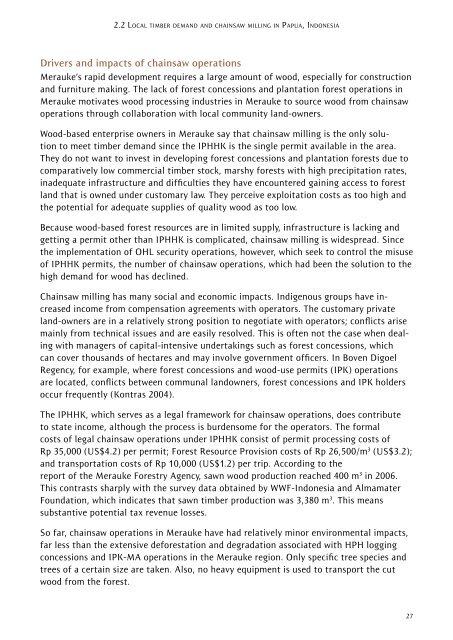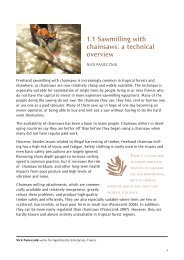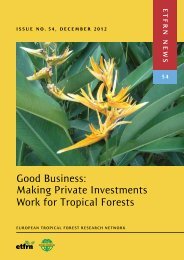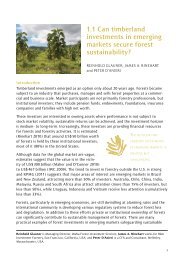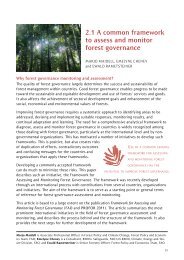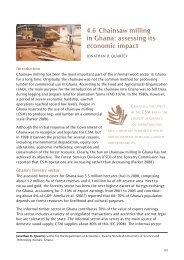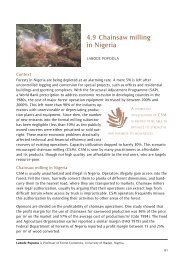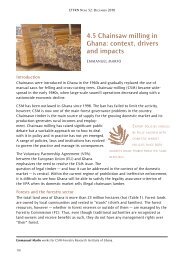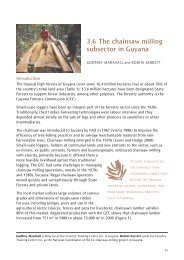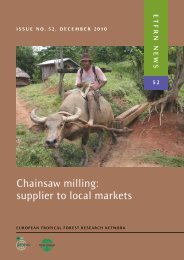Chainsaw milling - European Tropical Forest Research Network
Chainsaw milling - European Tropical Forest Research Network
Chainsaw milling - European Tropical Forest Research Network
Create successful ePaper yourself
Turn your PDF publications into a flip-book with our unique Google optimized e-Paper software.
2.2 local TimbER DEmaND aND chaiNsaw milliNg iN papua, iNDoNEsia<br />
Drivers and impacts of chainsaw operations<br />
merauke’s rapid development requires a large amount of wood, especially for construction<br />
and furniture making. The lack of forest concessions and plantation forest operations in<br />
merauke motivates wood processing industries in merauke to source wood from chainsaw<br />
operations through collaboration with local community land-owners.<br />
wood-based enterprise owners in merauke say that chainsaw <strong>milling</strong> is the only solution<br />
to meet timber demand since the iphhk is the single permit available in the area.<br />
They do not want to invest in developing forest concessions and plantation forests due to<br />
comparatively low commercial timber stock, marshy forests with high precipitation rates,<br />
inadequate infrastructure and difficulties they have encountered gaining access to forest<br />
land that is owned under customary law. They perceive exploitation costs as too high and<br />
the potential for adequate supplies of quality wood as too low.<br />
because wood-based forest resources are in limited supply, infrastructure is lacking and<br />
getting a permit other than iphhk is complicated, chainsaw <strong>milling</strong> is widespread. since<br />
the implementation of ohl security operations, however, which seek to control the misuse<br />
of iphhk permits, the number of chainsaw operations, which had been the solution to the<br />
high demand for wood has declined.<br />
<strong>Chainsaw</strong> <strong>milling</strong> has many social and economic impacts. indigenous groups have increased<br />
income from compensation agreements with operators. The customary private<br />
land-owners are in a relatively strong position to negotiate with operators; conflicts arise<br />
mainly from technical issues and are easily resolved. This is often not the case when dealing<br />
with managers of capital-intensive undertakings such as forest concessions, which<br />
can cover thousands of hectares and may involve government officers. in boven Digoel<br />
regency, for example, where forest concessions and wood-use permits (ipk) operations<br />
are located, conflicts between communal landowners, forest concessions and ipk holders<br />
occur frequently (kontras 2004).<br />
The iphhk, which serves as a legal framework for chainsaw operations, does contribute<br />
to state income, although the process is burdensome for the operators. The formal<br />
costs of legal chainsaw operations under iphhk consist of permit processing costs of<br />
rp 35,000 (us$4.2) per permit; <strong>Forest</strong> resource provision costs of rp 26,500/m 3 (us$3.2);<br />
and transportation costs of rp 10,000 (us$1.2) per trip. according to the<br />
report of the merauke <strong>Forest</strong>ry agency, sawn wood production reached 400 m 3 in 2006.<br />
This contrasts sharply with the survey data obtained by wwF-indonesia and almamater<br />
Foundation, which indicates that sawn timber production was 3,380 m 3 . This means<br />
substantive potential tax revenue losses.<br />
so far, chainsaw operations in merauke have had relatively minor environmental impacts,<br />
far less than the extensive deforestation and degradation associated with hph logging<br />
concessions and ipk-ma operations in the merauke region. only specific tree species and<br />
trees of a certain size are taken. also, no heavy equipment is used to transport the cut<br />
wood from the forest.<br />
27


